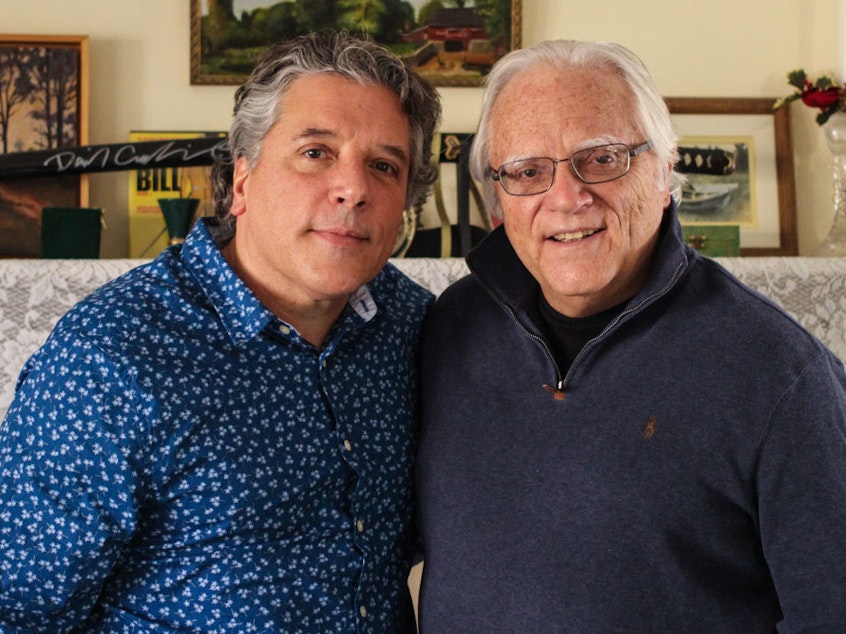A Postal Worker Loved His Job. But An 8-Day Postal Strike Was A 'Dignity Thing'

Fifty years ago, federal postal workers walked out in a strike that lasted eight days, spanned over 30 cities and prompted President Richard Nixon to declare a national emergency. The effort won postal workers living wages.
Tom Germano was one of them, picketing in the middle of New York City alongside fellow letter carriers and clerks. As a strike leader of Branch 36 of the National Association of Letter Carriers (NALC), Germano helped rally support.
At StoryCorps last month, Tom spoke to his son, Thomas Germano, 56, about how he found his calling delivering mail and why the strike mattered.
When Tom, now 80, started as a letter carrier around 1960, there was an adjustment period.
On his first day at the job, he had to deliver a bag full of mail to an apartment complex.
Sponsored
It wasn't as easy as it sounds.
"There's mail on the floor, and there's mail sticking out of boxes, then on each box there's often more than one name. There are similar names: J. Smith or A. Smith, or just says Mr. Smith," he recalled. "I couldn't find half the names and, I wanted to cry, I was just gonna ... sit down and say 'I can't do this.' "
"But once you learn it you could almost do it with your eyes closed."
Tom would eventually deliver mail in the working-class neighborhood where he grew up, greeting old neighbors and checking in on them when they didn't pick up the mail. His dedication to the job took him to some unexpected places — he once climbed down an elevator shaft to retrieve letters.
"It's a big responsibility, you know. Back then, the mail was sanctified," he said. "I loved the job."
Sponsored
Still, one couldn't earn a living wage just delivering mail.
"Almost everybody worked a second job," he said. "You just couldn't afford to raise a family and work there."
Tom, who had four kids at the time, said he and his family didn't seek welfare benefits.
"If you had three children, you were eligible for welfare and food stamps — which was embarrassing to most people," he said.
On March 18, 1970, picket lines were set up at midnight in New York City — the start of one of the largest strikes against the federal government in U.S. history. Tom gets emotional thinking about how he saw the community rallied around the striking postal workers.
Sponsored
"We didn't know if we'd have any support," he said. "The people that we delivered the mail to, the people in my neighborhood, they came and brought us coffee and cake and — how are we? and are we OK? — you know, the public was very supportive. Because you knew them, you had a relationship with them. We shared their lives."
"That mentality was contagious," he said. "It was like a collective mind."
He said that almost nobody crossed the picket line.
President Nixon called in the National Guard to assist in the delivery of the mail. Some National Guardsmen were actually postal workers themselves, who had signed up as a second job, but most were ill-equipped to deliver the mail without the proper training.
Tom and his colleagues risked getting fired and arrested by striking against the federal government. He said he cared deeply about doing right by the people on his route.
Sponsored
"We know what we deliver is important," he said.
But striking for fair pay was important too, he said.
The strike ultimately provided an 8% pay raise for postal workers. It also allowed postal workers to reach top pay in 8 years, instead of 21, as had previously been in effect.
"Sometimes you have to do a moral thing and a dignity thing," Tom said. "That's how I'd like to be remembered — somebody who helped people when he could."
Audio produced for Morning Edition by Camila Kerwin.
Sponsored
StoryCorps is a national nonprofit that gives people the chance to interview friends and loved ones about their lives. These conversations are archived at the American Folklife Center at the Library of Congress, allowing participants to leave a legacy for future generations. Learn more, including how to interview someone in your life, at StoryCorps.org. [Copyright 2020 NPR]

